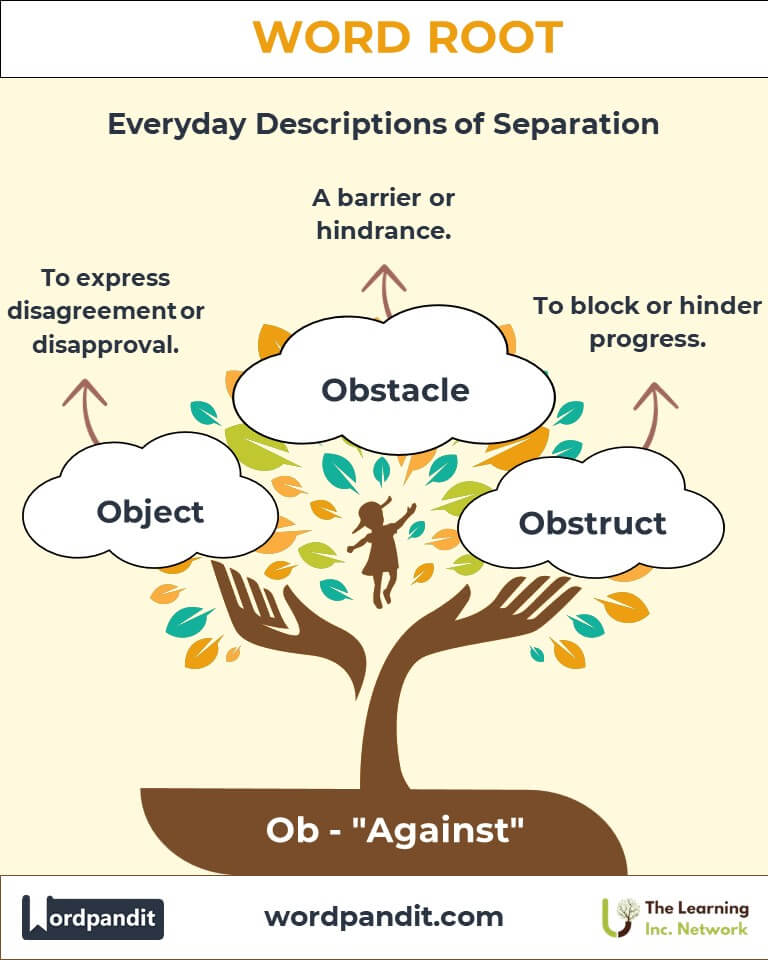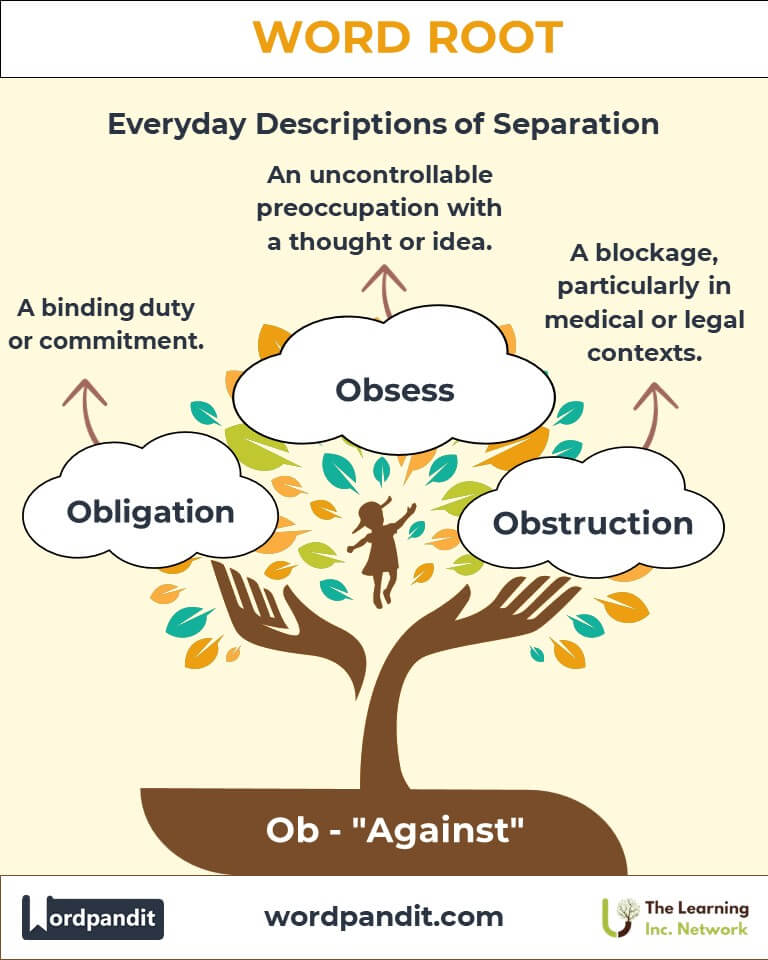Ob: The Root of Resistance in Language and Thought
Discover the powerful root "ob," originating from Latin, meaning "against." From everyday words like "object" and "obstacle" to specialized terms in law and psychology, "ob" underpins language expressions of opposition, barriers, and critical thought.

Table of Contents
- Introduction: The Essence of "Ob"
- Etymology and Historical Journey
- Mnemonic: Unlocking the Power of "Ob"
- Common "Ob"-Related Terms
- "Ob" Through Time
- "Ob" in Specialized Fields
- Illustrative Story: "Ob" in Action
- Cultural Significance of "Ob"
- The "Ob" Family Tree
- Conclusion: The Enduring Legacy of "Ob"
Introduction: The Essence of "Ob"
Imagine standing firm against a strong current. This defiance is captured by the Latin root "ob," meaning "against." Found in words like "object" (to oppose) and "obstacle" (a barrier), this root expresses resistance, conflict, and intentional opposition. Whether in debate, physical barriers, or moral stances, "ob" highlights the inherent tension in facing challenges.

Etymology and Historical Journey
The root "ob" traces back to Latin, where it conveyed opposition, confrontation, or movement "toward" with resistance. Early Roman texts used "ob" in words like "obstare" (to stand against) and "obligare" (to bind against). As Latin evolved into modern languages, "ob" retained its core meaning of opposition and was integrated into English through Old French.
Mnemonic: Unlocking the Power of "Ob"
To remember "ob," picture a giant boulder blocking a narrow path, symbolizing an obstacle you must overcome.
Mnemonic Device: “Ob means ‘against’—like an object in your way.”
Common "Ob"-Related Terms
- Object - To express disagreement or disapproval.
Example: "The lawyer objected to the misleading question." - Obstacle - A barrier or hindrance.
Example: "The fallen tree was an obstacle on the road." - Obligation - A binding duty or commitment.
Example: "He felt an obligation to support his family." - Obstruct - To block or hinder.
Example: "The construction work obstructed the view of the park." - Obvious - Easily perceived or understood.
Example: "The solution was obvious once we analyzed the data."
"Ob" Through Time
- Obstinate (Medieval Use) - Historically used to describe stubbornness in both literal and metaphorical contexts.
- Oblivion (Renaissance) - Derived from "oblivisci" (to forget), signifying resistance to remembrance.
"Ob" in Specialized Fields
- Law: Obligation - A legally binding duty or contract.
- Medicine: Obstruction - Blockages in arteries or airways.
- Psychology: Obsess - An uncontrollable preoccupation with a thought.
- Engineering: Obstacle Detection - A key feature in robotics and self-driving cars.
Illustrative Story: "Ob" in Action
In a bustling city, an ambitious architect named Clara faced an "obstacle" in the form of restrictive zoning laws. Determined to "object" to the outdated rules, she crafted an innovative design proposal that won over the city council. Her success showed how overcoming opposition (obstacles) can lead to progress.
Cultural Significance of "Ob"
The root "ob" embodies the human spirit of resistance and resilience. Philosophers and artists have explored "ob" through themes of rebellion and persistence, from existentialist confrontations of meaninglessness to overcoming obstacles in narratives.

The "Ob" Family Tree
- Op (Latin: "against"):
- Opposition: Resistance or dissent.
- Opponent: Someone against another in a conflict.
- Contra (Latin: "against"):
- Contrast: To show differences.
- Contrary: Opposed in nature or character.
- Anti (Greek: "against"):
- Antidote: A remedy counteracting poison.
- Antagonist: A character opposing the protagonist.

FAQs About the "Ob" Word Root
Q: What does "ob" mean?
A: The root "ob" means "against" or "in opposition to," originating from Latin. It denotes resistance, confrontation, or being set in contrast to something. This root is commonly found in words that convey blocking, hindrance, or deliberate disagreement, such as "object" or "obstacle."
Q: How does "obvious" relate to "ob"?
A: "Obvious" literally means "standing against" ignorance or hiddenness. It comes from the Latin "obvius" (in the way or exposed), implying that something is so clear that it practically confronts you, making it impossible to overlook.
Q: What’s the difference between "obstacle" and "obstruct"?
A: An obstacle is a physical or metaphorical barrier that prevents progress (e.g., "The mountain was an obstacle to their journey"). On the other hand, obstruct is an action, meaning to block or hinder progress intentionally (e.g., "Debris obstructed the road after the storm").
Q: Is "ob" always associated with negativity?
A: Not necessarily. While "ob" often implies resistance or opposition, it also appears in words like "obligation," which represents a positive duty or commitment. The context and the second part of the word determine whether "ob" conveys a negative or neutral meaning.
Q: Why is "ob" significant in legal contexts?
A: In law, "ob" plays a critical role in expressing opposition, duties, or constraints. For example, obligation represents a legal or moral duty, while object conveys disagreement or opposition during proceedings. This makes "ob" central to concepts of accountability and debate.
Q: How does "ob" appear in technology?
A: The influence of "ob" extends into modern fields like autonomous systems and data processing. Terms such as obstacle detection in robotics describe systems designed to recognize and navigate around barriers. Similarly, data obstruction refers to intentional or accidental blocking of data flow in technology.
Test Your Knowledge: "Ob" Word Root Quiz
1. What does the word root "Ob" mean?
2. What does "Obstruct" mean?
3. Which of the following words does NOT contain the root "Ob"?
4. What is an "obligation"?
5. In a debate, when someone "objects," what are they doing?
Conclusion: The Enduring Legacy of "Ob"
The root "ob" is a testament to the power of opposition and perseverance. Whether in linguistic expressions of resistance or the literal barriers we encounter, "ob" shapes how we face challenges. Its versatility across disciplines reminds us of the dynamic interplay between conflict and resolution, making it a cornerstone of communication and thought.
Meta Description: Explore the word root "ob," meaning "against," and its applications in words like "object" and "obstacle." Discover its historical, cultural, and practical significance.
Suggested URL: /ob-root-meaning-against














